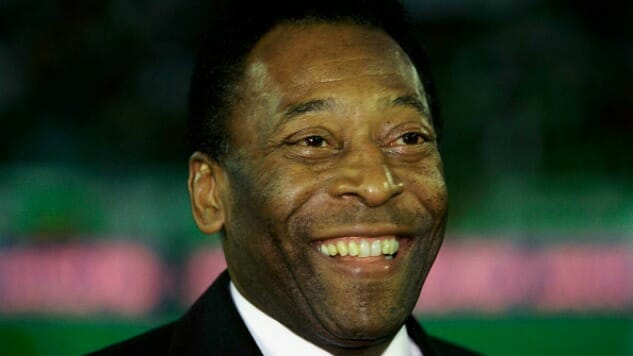The 20 Greatest Soccer Players of All Time
Photo by Manuel Blondeau/Getty
It’s the question always guaranteed to spark contentious debate amongst soccer fans. Who is the greatest player of all time? Given the ever-changing nature of the game, it’s perhaps an unanswerable one. How do you compare someone from the era of the pigskin ball, half-time oranges and legal backpass with the highly-trained, physically advanced multi-millionaires of today? Nevertheless, we’ve attempted to tackle it anyway, basing the results on a highly scientific combination of statistics, talent and overall impact on the sport. Here’s our verdict.
20. Eusebio

One of the first African-born players to make an impression on the international game, Eusebio steered Portugal to a third-place finish at the 1966 World Cup with a Golden Boot-winning nine goals. At club level, he scored 638 times in 614 appearances for Benfica, lifting eleven league titles, a European Cup and a Ballon d’Or during a prolific 15-year run. The ‘Black Panther’ also possessed a humility every bit as extraordinary as his athletic prowess, technical skill and phenomenal range of finishing. A firm believer in fair play, he once applauded Alex Stepney just seconds after the Manchester United keeper had denied him a late winner in the 1968 European Cup final.
19. George Best

Who knows what else George Best could have achieved had he not squandered his talent with his tabloid-baiting love of ‘booze, birds and fast cars?’ But despite quitting Manchester United, and essentially his top-flight career, at the age of just 27, the hard-partying winger still remains an iconic figure. Quite simply he was one of the most naturally gifted players the game has ever seen. Blessed with a magical dribbling ability, blistering pace and a sense of balance which one writer claimed ‘would have made Isaac Newton decide he might as well have eaten the apple,’ Best inspired awe every time he stepped onto the field. Hailing from the humble soccer nation of Northern Ireland, he never got the chance to showcase his talents on the world stage, but he did win two league titles and a European Cup as a pivotal member of Sir Matt Busby’s rebuilt United side.
18. Bobby Moore

Legendary Celtic manager Jock Stein once joked that there should have been a law against Bobby Moore for his ability to ‘know what’s happening 20 minutes before everyone else.’ It was this level of intuition which allowed the West Ham and Fulham hero to pull off the all-time greatest tackle with such astounding precision. Of course, Moore first shone on the international stage at the 1966 World Cup. There, his defensive skills were so masterful that he even managed to overshadow hattrick hero Geoff Hurst in the controversial final – the image of him being raised aloft with the trophy in hand remains one of the most iconic in English soccer history.
17. Marco van Basten

It’s hard to think of anything but that goal against Russia at the Euro 1988 final when it comes to Marco van Basten. But there was so much more to the Dutchman than impossibly tight-angled volleys. Equipped with a ballerina-esque agility, two-footed close control and an intelligent reading of the game, he was arguably the most graceful striker of his generation. His killer instinct in front of goal not only gave the Netherlands their first ever major international trophy, it also guided Ajax to three Eredivisie titles and a Cup Winners’ Cup, and Barcelona to four La Liga championships and three European Cups. Had his career not been cut short by a persistent ankle injury at the age of just 28, there’s no doubt that van Basten would have achieved even greater things with both club and country.
16. Lev Yashin

Nicknamed the Black Spider for his choice of dark head-to-toe attire, Lev Yashin not only revolutionised goalkeeping fashion, he also changed the role of the No.1 forever. Whereas keepers had previously been restricted to silently standing on the goalline, Yashin pioneered the practice of barking at defenders and rushing out of the six-yard box to intercept crosses and thwart oncoming attackers. It was an approach which made him a star of the first ever televised World Cup in 1958 and helped the Soviet Union pick up a gold medal at the 1956 Olympics and the inaugural European Championships in 1960. The only goalkeeper ever to win the Ballon d’Or, the Dynamo Moscow mainstay also kept over 270 clean sheets and saved an astonishing 150 penalties during a near-psychic 22-year career.
-

-

-

-

-

-

-

-

-

-

-

-

-

-

-

-

-

-

-

-

-

-

-

-

-

-

-

-

-

-

-

-

-

-

-

-

-

-

-

-























































